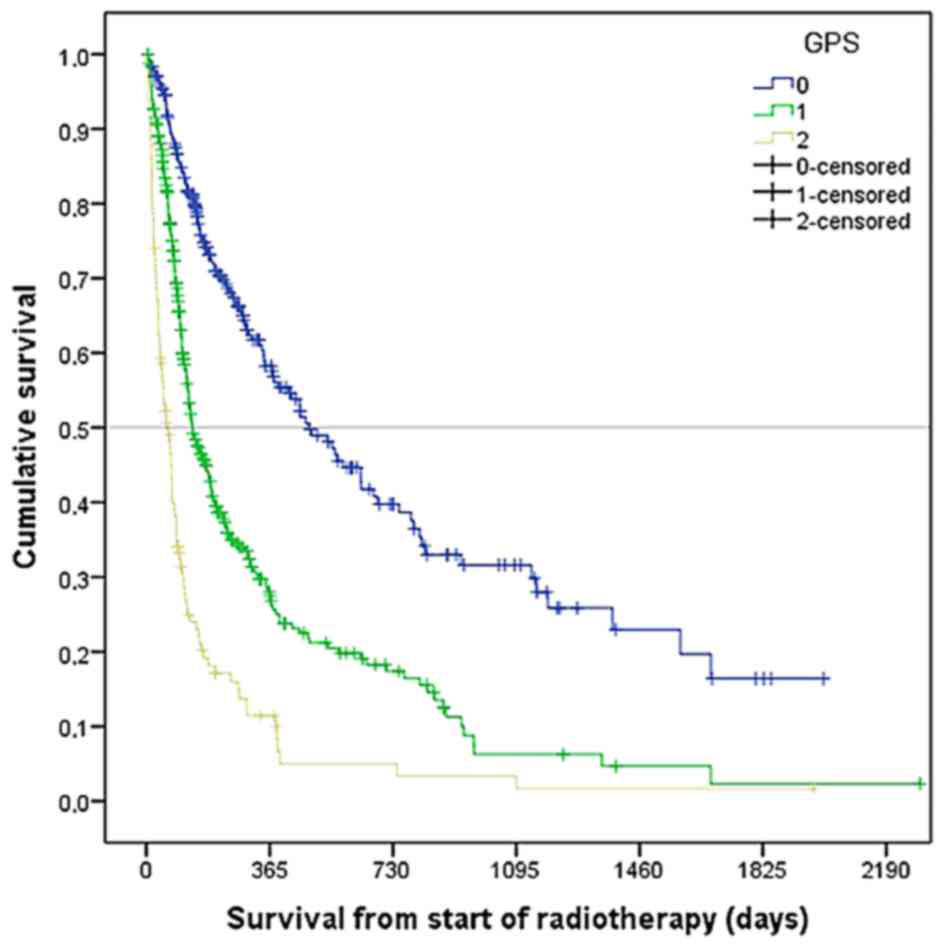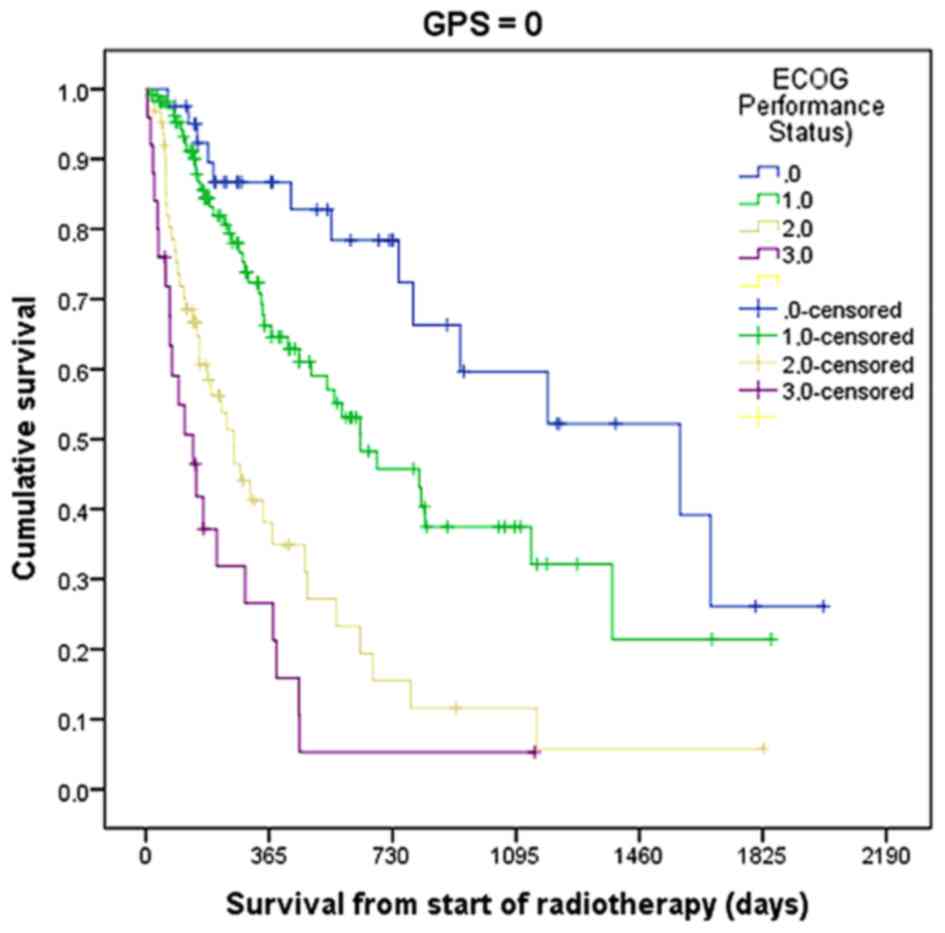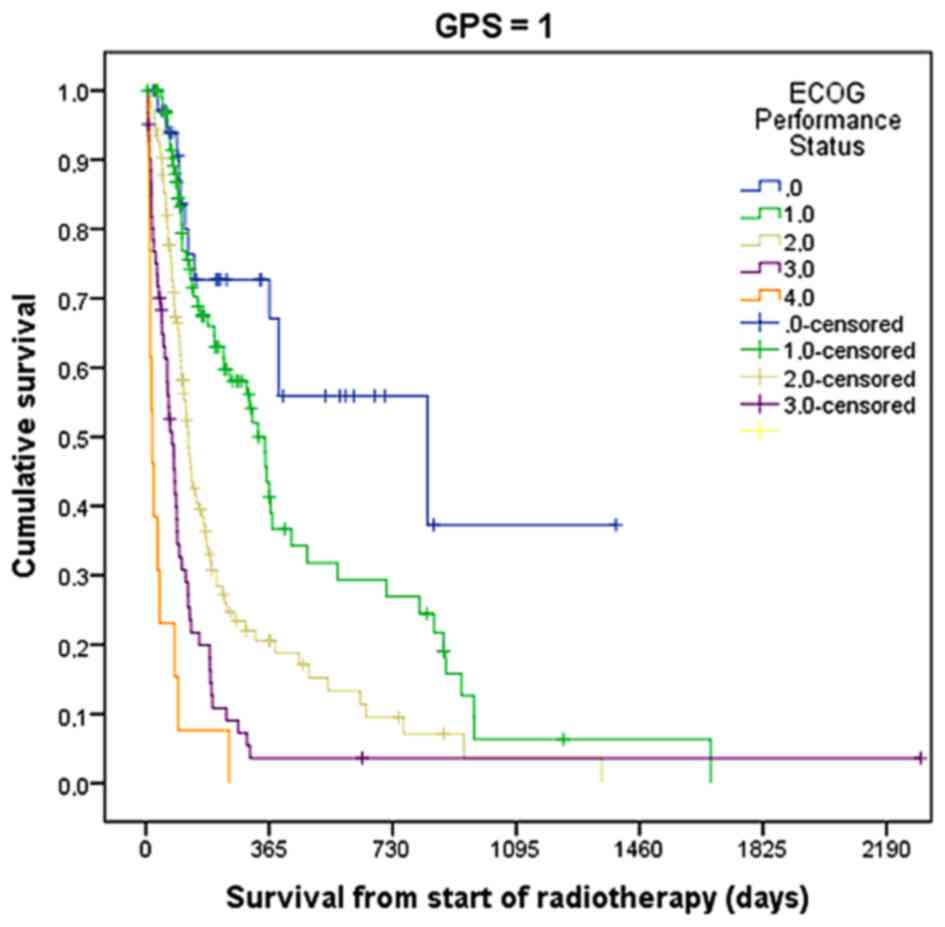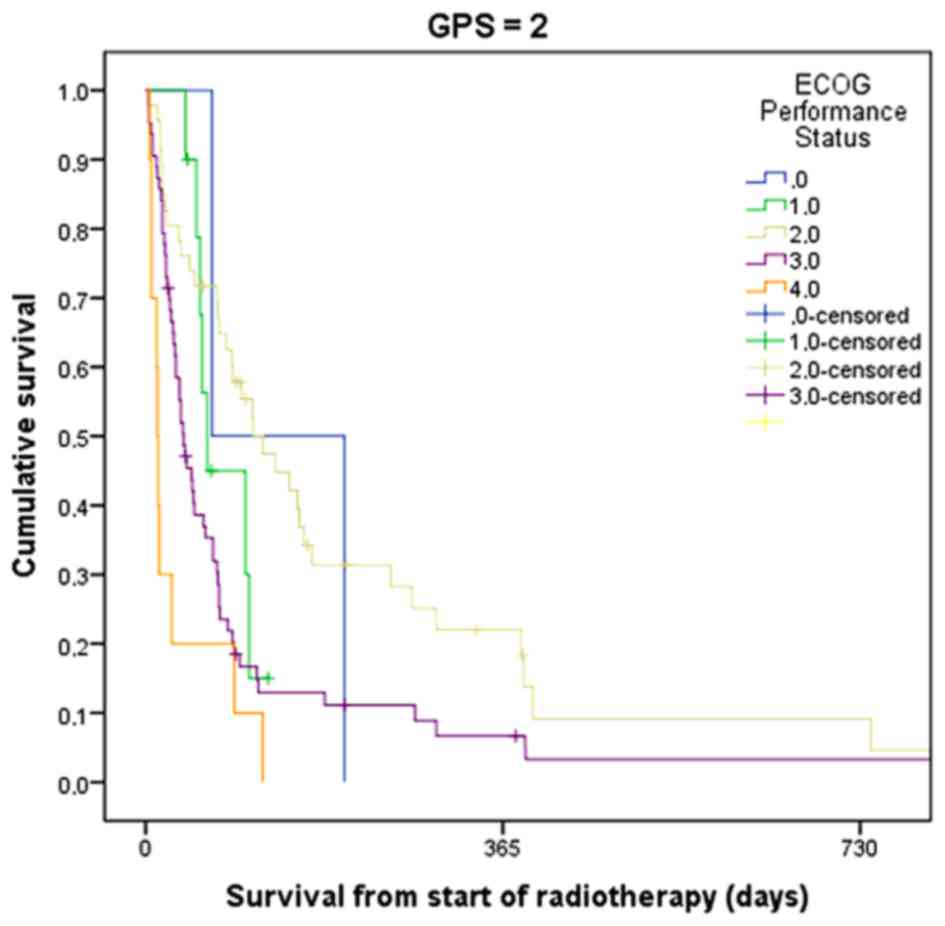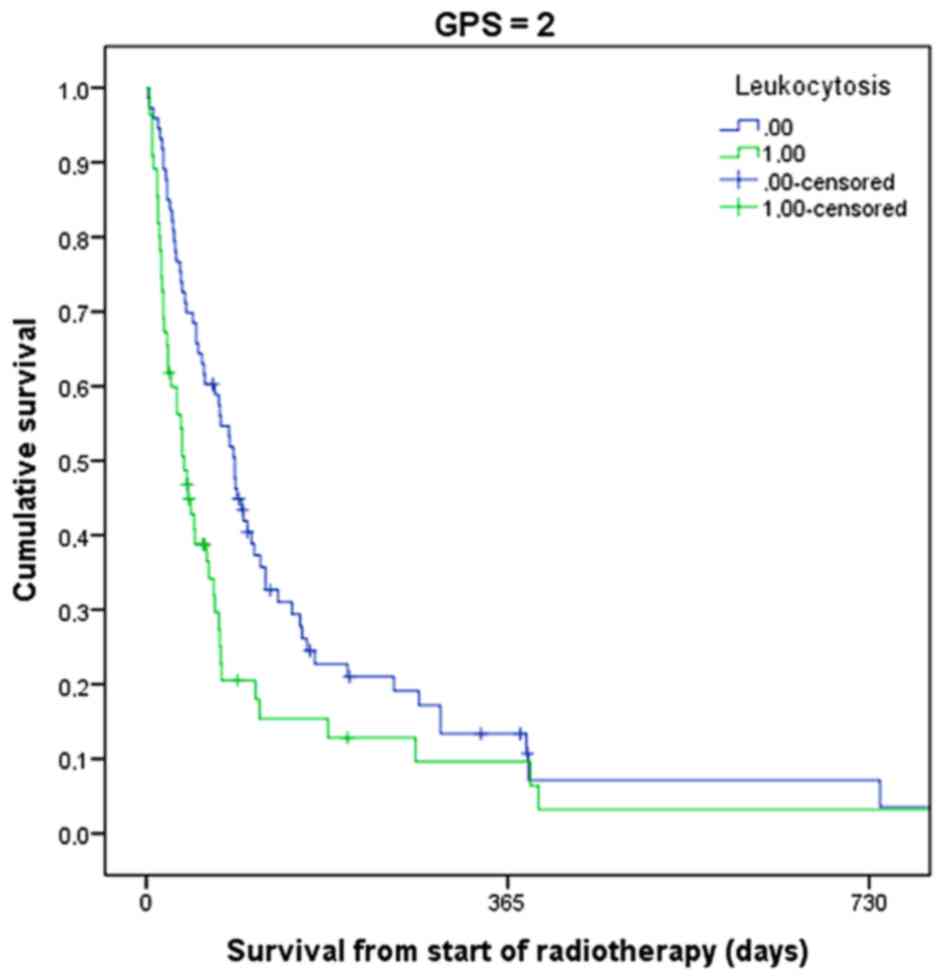|
1
|
Tseng YD, Krishnan MS, Sullivan AJ, Jones
JA, Chow E and Balboni TA: How radiation oncologists evaluate and
incorporate life expectancy estimates into the treatment of
palliative cancer patients: A survey-based study. Int J Radiat
Oncol Biol Phys. 87:471–478. 2013. View Article : Google Scholar : PubMed/NCBI
|
|
2
|
Likhacheva A, Pinnix CC, Parikh NR, Allen
PK, McAleer MF, Chiu MS, Sulman EP, Mahajan A, Guha-Thakurta N,
Prabhu SS, et al: Predictors of survival in contemporary practice
after initial radiosurgery for brain metastases. Int J Radiat Oncol
Biol Phys. 85:656–661. 2013. View Article : Google Scholar : PubMed/NCBI
|
|
3
|
Forrest LM, McMillan DC, McArdle CS,
Angerson WJ and Dunlop DJ: Comparison of an inflammation-based
prognostic score (GPS) with performance status (ECOG) in patients
receiving platinum-based chemotherapy for inoperable non-small-cell
lung cancer. Br J Cancer. 90:1704–1706. 2004.PubMed/NCBI
|
|
4
|
Proctor MJ, Morrison DS, Talwar D, Balmer
SM, O'Reilly DS, Foulis AK, Horgan PG and McMillan DC: An
inflammation-based prognostic score (mGPS) predicts cancer survival
independent of tumour site: A Glasgow Inflammation Outcome Study.
Br J Cancer. 104:726–734. 2011. View Article : Google Scholar : PubMed/NCBI
|
|
5
|
Proctor MJ, Morrison DS, Talwar D, Balmer
SM, Fletcher CD, O'Reilly DS, Foulis AK, Horgan PG and McMillan DC:
A comparison of inflammation-based prognostic scores in patients
with cancer. A Glasgow Inflammation Outcome Study. Eur J Cancer.
47:2633–2641. 2011. View Article : Google Scholar : PubMed/NCBI
|
|
6
|
Linton A, Pond G, Clarke S, Vardy J,
Galsky M and Sonpavde G: Glasgow prognostic score as a prognostic
factor in metastatic castration-resistant prostate cancer treated
with docetaxel-based chemotherapy. Clin Genitourin Cancer.
11:423–430. 2013. View Article : Google Scholar : PubMed/NCBI
|
|
7
|
Guadagnolo BA, Liao KP, Elting L, Giordano
S, Buchholz TA and Shih YC: Use of radiation therapy in the last 30
days of life among a large population-based cohort of elderly
patients in the United States. J Clin Oncol. 31:80–87. 2013.
View Article : Google Scholar : PubMed/NCBI
|
|
8
|
Murphy JD, Nelson LM, Chang DT, Mell LK
and Le QT: Patterns of care in palliative radiotherapy: A
population-based study. J Oncol Pract. 9:e220–e227. 2013.
View Article : Google Scholar : PubMed/NCBI
|
|
9
|
Kapadia NS, Mamet R, Zornosa C, Niland JC,
D'Amico TA and Hayman JA: Radiation therapy at the end of life in
patients with incurable nonsmall cell lung cancer. Cancer.
118:4339–4345. 2012. View Article : Google Scholar : PubMed/NCBI
|
|
10
|
Kelly CM and Shahrokni A: Moving beyond
Karnofsky and ECOG performance status assessments with new
technologies. J Oncol. 2016:61865432016. View Article : Google Scholar : PubMed/NCBI
|
|
11
|
Hahn C, Kavanagh B, Bhatnagar A, Jacobson
G, Lutz S, Patton C, Potters L and Steinberg M: Choosing wisely:
The American Society for Radiation Oncology's top 5 list. Pract
Radiat Oncol. 4:349–355. 2014. View Article : Google Scholar : PubMed/NCBI
|
|
12
|
Olson RA, Tiwana MS, Barnes M, Kiraly A,
Beecham K, Miller S, Hoegler D and Olivotto I: Use of single-
versus multiple-fraction palliative radiation therapy for bone
metastases: Population-based analysis of 16,898 courses in a
Canadian province. Int J Radiat Oncol Biol Phys. 89:1092–1099.
2014. View Article : Google Scholar : PubMed/NCBI
|
|
13
|
Sperduto PW, Chao ST, Sneed PK, Luo X, Suh
J, Roberge D, Bhatt A, Jensen AW, Brown PD, Shih H, et al:
Diagnosis-specific prognostic factors, indexes, and treatment
outcomes for patients with newly diagnosed brain metastases: A
multi-institutional analysis of 4,259 patients. Int J Radiat Oncol
Biol Phys. 77:655–661. 2010. View Article : Google Scholar : PubMed/NCBI
|
|
14
|
Gaspar L, Scott C, Rotman M, Asbell S,
Phillips T, Wasserman T, McKenna WG and Byhardt R: Recursive
partitioning analysis (RPA) of prognostic factors in three
Radiation Therapy Oncology Group (RTOG) brain metastases trials.
Int J Radiat Oncol Biol Phys. 37:745–751. 1997. View Article : Google Scholar : PubMed/NCBI
|
|
15
|
Partl R, Richtig E, Avian A, Berghold A
and Kapp KS: Karnofsky performance status and lactate dehydrogenase
predict the benefit of palliative whole-brain irradiation in
patients with advanced intra- and extracranial metastases from
malignant melanoma. Int J Radiat Oncol Biol Phys. 85:662–666. 2013.
View Article : Google Scholar : PubMed/NCBI
|
|
16
|
Tan CS, Read JA, Phan VH, Beale PJ, Peat
JK and Clarke SJ: The relationship between nutritional status,
inflammatory markers and survival in patients with advanced cancer:
A prospective cohort study. Support Care Cancer. 23:385–391. 2015.
View Article : Google Scholar : PubMed/NCBI
|
|
17
|
Anshushaug M, Gynnild MA, Kaasa S, et al:
Characterization of patients receiving palliative chemo- and
radiotherapy during end of life at a regional cancer center in
Norway. Acta Oncol. 27:1–8. 2014.
|
|
18
|
Leung EY, Scott HR and McMillan DC:
Clinical utility of the pretreatment glasgow prognostic score in
patients with advanced inoperable non-small cell lung cancer. J
Thorac Oncol. 7:655–662. 2012. View Article : Google Scholar : PubMed/NCBI
|
|
19
|
Laird BJ, Kaasa S, McMillan DC, Fallon MT,
Hjermstad MJ, Fayers P and Klepstad P: Prognostic factors in
patients with advanced cancer: A comparison of clinicopathological
factors and the development of an inflammation-based prognostic
system. Clin Cancer Res. 19:5456–5464. 2013. View Article : Google Scholar : PubMed/NCBI
|
|
20
|
Furukawa K, Shiba H, Haruki K, Fujiwara Y,
Iida T, Mitsuyama Y, Ogawa M, Ishida Y, Misawa T and Yanaga K: The
Glasgow prognostic score is valuable for colorectal cancer with
both synchronous and metachronous unresectable liver metastases.
Oncol Lett. 4:324–328. 2012.PubMed/NCBI
|
|
21
|
Gioulbasanis I, Pallis A, Vlachostergios
PJ, Xyrafas A, Giannousi Z, Perdikouri IE, Makridou M, Kakalou D
and Georgoulias V: The Glasgow Prognostic Score (GPS) predicts
toxicity and efficacy in platinum-based treated patients with
metastatic lung cancer. Lung Cancer. 77:383–388. 2012. View Article : Google Scholar : PubMed/NCBI
|
|
22
|
Angelo K, Norum J, Dalhaug A, Pawinski A,
Aandahl G, Haukland E, Engljähringer K and Nieder C: Development
and validation of a model predicting short survival (death within
30 days) after palliative radiotherapy. Anticancer Res. 34:877–885.
2014.PubMed/NCBI
|
|
23
|
Gripp S, Mjartan S, Boelke E and Willers
R: Palliative radiotherapy tailored to life expectancy in end-stage
cancer patients: Reality or myth? Cancer. 116:3251–3256. 2010.
View Article : Google Scholar : PubMed/NCBI
|
|
24
|
Nieder C, Angelo K, Dalhaug A, Pawinski A,
Haukland E and Norum J: Palliative radiotherapy during the last
month of life: Predictability for referring physicians and
radiation oncologists. Oncol Lett. 10:3043–3049. 2015.PubMed/NCBI
|
|
25
|
Proctor MJ, Horgan PG, Talwar D, Fletcher
CD, Morrison DS and McMillan DC: Optimization of the systemic
inflammation-based Glasgow prognostic score: A Glasgow Inflammation
Outcome Study. Cancer. 119:2325–2332. 2013. View Article : Google Scholar : PubMed/NCBI
|















